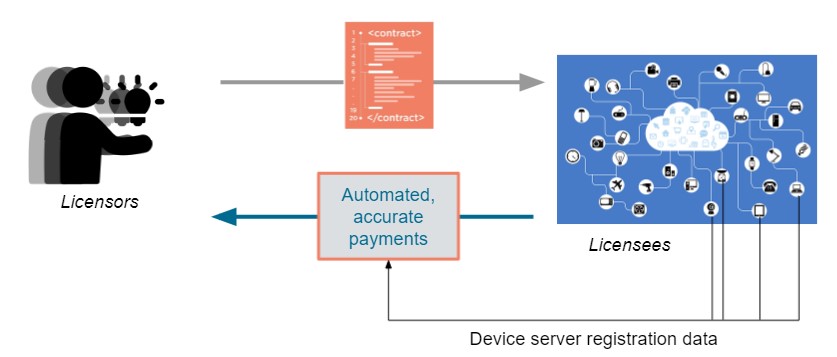Developing innovations for the digital economy, such as IoT devices and connected mobility solutions is likely to require OEMs to combine IP from multiple sources (licensors) who exploit their IP to as many as possible licensees (other OEMs). Those involved in the provision of what we call distributed multi-IP solutions (d-mIPs) find themselves entangled in a complex many-to-many network or ‘licensing web’ having to operate payments based on licensing contracts under a variety of terms and conditions.
In the digital economy and ‘pro-licensing era’ efficiently operating licensing payments to/from multiple licensors/licensees becomes increasingly mission-critical. Unfortunately, the current semi-manual processes are inherent of information asymmetries, uncertainties, trust problems and transaction costs, hence should probably be considered inefficient. This project explores the challenges licensees and licensors face when operating licensing payments for d-mIPs and the potential that distributed-ledger technologies, such as Blockchain, can offer to help pushing this business process into the digital economy.
We are particularly interested in automated licensing payment systems (ALPS) based on distributed-ledger technologies and smart contracts for automating trustworthy licensing payments that can substantially reduce currently existing challenges. Those systems not only contribute to enabling the digital economy, but have further potential to enable new business models. ALPS are defined as platform technologies that enable the automated calculation, execution and verification of accurate payments from licensees to licensors. ALPS seek to lower costs for administering payments, while increasing accuracy, reducing the trust problem and eliminating the need for audits, overall enabling more efficient licensing and novel business models as well as contributing to fairer value distribution to inventors.
This is a collaborative project jointly run by the IIPM Lab at the Department of Engineering and colleagues at the Department of Computer Science at the University of Pisa. The origins of the project were kindly supported by Research England via the Connecting Capability Fund award CCF18-7157 - Promoting the Internet of Things via Collaboration between HEIs and Industry (Pitch-In project).
Case study: https://www.ifm.eng.cam.ac.uk/uploads/Pitch_In_Case_Study_Alps.pdf
Videos:
Video with ARM co-founder Jamie Urquhart and Prof. Jon Crowcroft: https://www.youtube.com/watch?v=XljWgFuitQs
Short animation explaining ALPS https://youtu.be/7lLayRNK2u4
Pitch-In project page: https://pitch-in.sites.sheffield.ac.uk/projects/prototyping-an-iot-platform-for-automated-ip-licensing-payments
Research publications
-
Severin Bonnet; Damiano Di Francesco Maesa; Matteo Loporchio; Frank Tietze, 2025. A Fair and Trustworthy Remuneration Framework for AI Model Training Using DLT. Presented at the IEEE International Conference on Blockchain and Cryptocurrency, Pisa, Italy.
- Fletcher, S. and F. Tietze (forthcoming). Automating licensing payments for connected devices – A techno-economic analysis of DLT based systems. Blockchain: a managerial perspective for industry. F. Urmetzer, Springer.
-
Di Francesco Maesa, D., Loporchio, M., Tietze, F., (2025). Privacy-Preserving and Automated Intellectual Property License Agreements over Heterogeneous Blockchain Networks. Blockchain: Research and Applications 100288. https://doi.org/10.1016/j.bcra.2025.100288
-
Di Francesco Maesa, D., Tietze, F., (2023). Automating Intellectual Property License Agreements with DLT, in: 2023 IEEE International Conference on Decentralized Applications and Infrastructures (DAPPS). Presented at the 2023 IEEE International Conference on Decentralized Applications and Infrastructures (DAPPS), pp. 48–56. https://doi.org/10.1109/DAPPS57946.2023.00016
- Di Franceso-Maesa, D. , F. Tietze and J. Theye (2021). Putting Trust back in IP Licensing: DLT Smart Licenses for the Internet of Things. IEEE International Conference on Blockchain and Cryptocurrency. Virtual / Sydney.
- Tietze, F., D. Di Francesco Maesa and J. Theye (2020). On-demand IP licensing for the digital economy. CTM Working Paper Series. University of Cambridge, UK.
- Tietze, F. and O. Granstrand (2019). Enabling the digital economy - distributed ledger technologies for automating IP licensing payments. Managing Innovation in a Global and Digital World - Meeting Societal Challenges and Enhancing Competitiveness. R. Tiwari and S. Buse, Springer Gabler.
Patents
- Tietze, Frank, and Damiano DI FRANCESCO MAESA. System and method for determining and executing usage- based transactions using smart contracts and distributed ledger arrangements. United States US20220327551A1, filed 4 September 2020, and issued 13 October 2022.
Research theses
- Aslan, E. (2023). The Role of Blockchain and Distributed Ledger Technology for the Management of Intellectual Property. In collaboration with RWTH Aachen.
- Huang, J. (2023). Exploring IP Challenges and Blockchain Opportunities in the Metaverse. In collaboration with Technical University of Munich.
- Schmitz, M. (2022). Development of a methodology for the implementation of usage-based business models at licensors. In collaboration with RWTH Aachen.
- Theye, J. (2020). Introducing the Bill-of-IP: a novel concept for the digital IP management applied in a DLT-based smart licensing system. In collaboration with Technical University of Munich.
- Fletcher, S. (2019). MELT Analysis of an Automated Payment System for Licensing Royalties using Distributed Ledger Technology. Department of Engineering, Institute for Manufacturing. Cambridge, UK.
Project leads: Prof. Frank Tietze, Dr Damiano di Francesco Maesa (University of Pisa)





